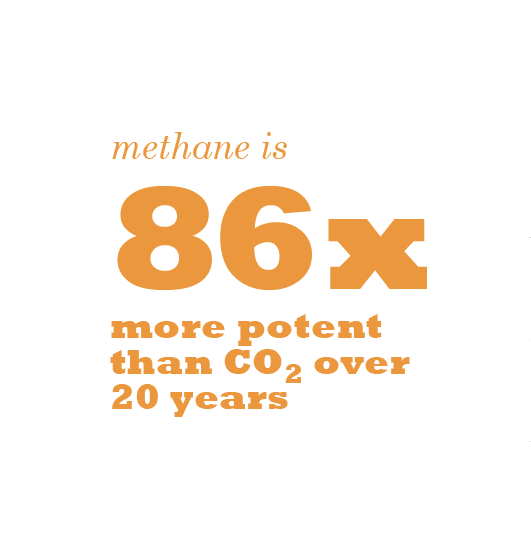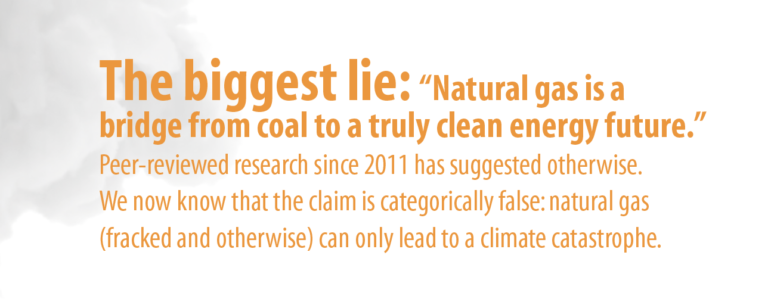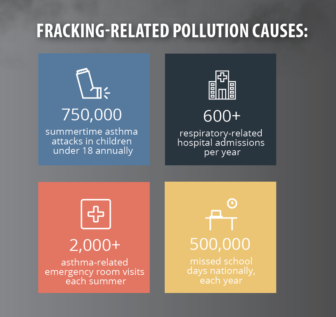Climate Change: the complex issue that we just can’t seem to figure out. Confusion around the causes and effects of climate change make it easy for the oil and gas industry, its scientists for hire, and scheming politicians to muddy the issue.
Industry touted natural gas as a “bridge fuel” on the path to cleaner, more sustainable fuel sources, but climate change has accelerated beyond what most climate science predicted. Until recently, climate science focused on carbon dioxide (CO2). It wasn’t until 2011 that the first peer-reviewed study was published looking at the climate impacts of methane from fracking-related (oil and gas) development. When this study was released, it warned that fracked gas was not a suitable bridge fuel, we were well into the fracking boom that started in 2006.

Most people are still not fully aware of the fracked gas threat. When the media does write about fracked gas, they often use outdated information about its potential to warm the planet compared to CO2, declaring that the methane released by fracking is “only” 30 times as powerful a greenhouse gas over 100 years.
Here’s the breaking news: According to Scientific American, “Methane warms the planet on steroids for a decade or two before decaying to CO2…Short-lived climate pollutants [like methane] that we emit from human activities [mainly oil and gas production] are basically controlling how fast the warming occurs.”
So harmful is methane that the Intergovernmental Panel on Climate Change (IPCC) determined that it is 86 times more potent than CO2 over a 20 year period. We now know methane is actually more like 100 times more potent than CO2 over two decades.
As we say in Texas, it’s time to fish or cut bait: Humanity is facing a crisis requiring immediate action for our survival.
Reducing Methane Emissions Will Slow Climate Change. An immediate reduction in methane pollution would give us more time to deal with the carbon dioxide threat. Cutting methane means putting an end to new oil and gas extraction and the buildout of infrastructure associated with oil and gas use.
It’s been more than ten years since the fracking boom started. The oil and gas industry has lied to us, denying long term impacts on our climate, our health, and our safety.
While natural gas burns cleaner than coal, it is by no means clean, as the infrared video still of a “state of the art” gas-fired power plant in Texas shows (below left). Multiple studies released earlier this year indicate that no matter how clean they burn, gas and oil emit so much methane during production that they’re at least as bad and probably worse for climate than coal.

While we’ve known for many years that global methane has increased dramatically since the start of the fracking boom, this year a NASA study authoritatively determined oil and gas production is responsible for this ongoing methane spike.
And with the data from the NASA and other studies, we now know why the historic climate change models have been so off. Climate scientists didn’t properly account for methane pollution because it was assumed switching to natural gas would be good for climate. In a nightmarish turn of events, natural gas is instead making climate change worse.
We don’t have time for more false promises from the very industry that created this problem. We need a real solution, and we need it now.
Rules and laws have not worked. Even if we are to believe that “fixes” are technically possible, time has shown us that the oil and gas industry won’t reform voluntarily. There is neither the money or the political will to hire enough regulators to enforce rules and laws.
Earthworks will continue to expose what big industry is allowed to do to our earth and our climate.We will continue to advocate for the one true climate solution: When it comes to natural gas, keep it in the ground.
More Information:
- See this article and others in the Winter 2018 Earthworks Journal
- Sources: Fracking, methane, and health impacts
- Oil + Gas Threat Map
- Methane Infographic
- Oil and gas health impacts




